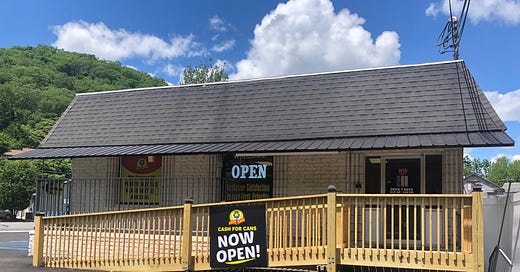Cash for Cans and Recycling Concerns
Port Jervis. The business brings opportunities with some restrictions.
By Fern Ashworth
Cash for Cans, a bottle and can redemption center at 33 Orange St., opened for business in April. The owner, Surjeet (“Tony”) Singh, currently has three other redemption businesses in New York State: in Chester, Middletown, and Carmel Hamlet. Singh chose Port Jervis for the newest location because, he said, “There is no other recycling center like this in the town.”
Stanley Siegel, Port Jervis Fourth Ward Councilman, recalled how, when the business was first proposed, he was concerned about broken bottles and other waste accumulating outside the building. A visit to Singh’s Middletown location reassured him that wouldn’t be an issue; Siegel said the business was “immaculate and well organized.” Satisfied by what he saw, Siegel predicted that the business “would be good for Port Jervis.”
The Port Jervis facility is clean and orderly, has ample parking, and is accessible by ramp from the parking lot to the entrance. There are no reverse vending machines (RVMs); returns are all hand sorted. All containers bearing a “New York 5¢ deposit” label are accepted, as long as they are not broken or crushed, and their labels are still attached.
However, an important stipulation is that the container must have been purchased in New York State to be legally redeemed. Dana Ferine, a New York Department of Environmental Conservation (DEC) spokesperson, confirmed that the Returnable Container Act (RCA), more commonly referred to as “The Bottle Bill,” requires redemption centers to conspicuously display a “Redemption Warning” sign. A $100 penalty can be imposed for each beverage container returned, up to $25,000, for anyone found returning 48 or more empty beverage containers on which the person should reasonably know that a deposit was never paid in New York State, Ferine said.
Singh said that he does not ask customers for information about where they live, with the exception of those with bulk returns of 2500 cans or more, when he does log the required information, such as name, address and license plate, since failure to do so might result in a hefty fine of $1000 for each violation and each day a violation continues.
Illegal returns are not so great a concern for redemption businesses located in central New York, but the issue is more prevalent along state borders, especially since New York is adjacent to two non-deposit states, Pennsylvania and New Jersey, and there is rarely a way to visually distinguish bottles that are not redeemable. A notable exception to this is Nestle Waters products sold in Northeastern states. These bottles have a red band around the label, a different barcode and lack a deposit message.
According to the DEC website, the Bottle Bill has been successful, reducing beverage container litter by 70%, and generating $117 million in revenue in 2022. However, the potential for fraud is significant. The DEC estimates that bottle fraud costs the state “tens or even hundreds of millions of dollars,” according to their website. On October 23, 2023, the DEC announced a multi-agency effort by the New York State Department of Taxation and Finance, NYS Department of Agriculture and Markets, NYS Liquor Authority and others to combat bottle fraud in its various forms.
However, for redemption centers statewide, concerns regarding bottle fraud are eclipsed by the growing fear of having to close, since they operate with a handling fee that hasn’t increased since 2009. Jade Eddy, owner of MT Returnables in Queensbury, NY, said that over 142 redemption centers went out of business last year, and she is worried about the future of the rest.
“We are dying under these circumstances,” she said. “It’s not just that we aren’t being paid a fair rate anymore. Our issue is doubled by the fact that we are also suffering a loss in volume as new beverages have become very popular and the state refuses to update the covered containers.”
Eddy is referring to recently proposed changes to the Bottle Bill that, in addition to raising the deposit from 5¢ to 10¢, would have increased the handling fee from 3.5¢ to 6¢, and would have expanded the types of containers allowed. These changes were not approved by legislators by the end of this year’s session. Eddy is frustrated by what she sees as indifference to the plight of the redemption centers.
“Why don’t we matter?” she asked. “We’re being treated as less than anything. We feel we’re invisible.”
She says she has some hope that the governor will “throw us a lifeline,” but worries that some redemption centers won’t make it through the summer, let alone the colder months when business slows even further.
Can a store opt out of participating in the bottle deposit program? For example, I went to Dollar Tree on Jersey Ave in Port Jervis and bought a drink that is labeled NY 5¢ deposit. I asked if they handle returns there, and they said no, but I could go to the redemption center in town, or maybe Save A Lot. To be fair, it doesn't appear that I was charged a deposit. But, can stores choose not to participate in the program?
“Stores cannot ‘opt out’ of accepting bottle and can deposit returns,” said the DEC Bottle Bill Team on their webpage. “Stores that sell beverages with a deposit are required by New York State law to accept deposit beverage container returns on deposit beverages that they sell.”
Community focused news can only succeed with community support. Please consider the various subscription levels.




